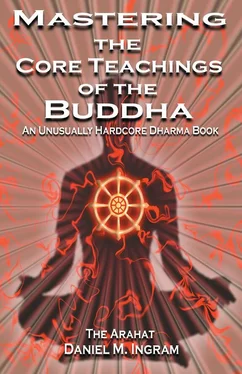Daniel Ingram - Mastering the Core Teachings of Buddha - An Unusually Hardcore Dharma Book
Здесь есть возможность читать онлайн «Daniel Ingram - Mastering the Core Teachings of Buddha - An Unusually Hardcore Dharma Book» весь текст электронной книги совершенно бесплатно (целиком полную версию без сокращений). В некоторых случаях можно слушать аудио, скачать через торрент в формате fb2 и присутствует краткое содержание. Год выпуска: 2009, ISBN: 2009, Издательство: Aeon Books, Жанр: Старинная литература, на русском языке. Описание произведения, (предисловие) а так же отзывы посетителей доступны на портале библиотеки ЛибКат.
- Название:Mastering the Core Teachings of Buddha - An Unusually Hardcore Dharma Book
- Автор:
- Издательство:Aeon Books
- Жанр:
- Год:2009
- ISBN:9781904658405
- Рейтинг книги:5 / 5. Голосов: 1
-
Избранное:Добавить в избранное
- Отзывы:
-
Ваша оценка:
- 100
- 1
- 2
- 3
- 4
- 5
Mastering the Core Teachings of Buddha - An Unusually Hardcore Dharma Book: краткое содержание, описание и аннотация
Предлагаем к чтению аннотацию, описание, краткое содержание или предисловие (зависит от того, что написал сам автор книги «Mastering the Core Teachings of Buddha - An Unusually Hardcore Dharma Book»). Если вы не нашли необходимую информацию о книге — напишите в комментариях, мы постараемся отыскать её.
Mastering the Core Teachings of Buddha - An Unusually Hardcore Dharma Book — читать онлайн бесплатно полную книгу (весь текст) целиком
Ниже представлен текст книги, разбитый по страницам. Система сохранения места последней прочитанной страницы, позволяет с удобством читать онлайн бесплатно книгу «Mastering the Core Teachings of Buddha - An Unusually Hardcore Dharma Book», без необходимости каждый раз заново искать на чём Вы остановились. Поставьте закладку, и сможете в любой момент перейти на страницу, на которой закончили чтение.
Интервал:
Закладка:
99
Content and Ultimate Reality
If meditators would actually just go microscopic and try to see the Three Characteristics of each and every individual little sensation that makes up their experience, then they might begin to actually understand reality at the level that makes the difference. Effectively encouraging students to shift their attention from fixation on content and the macroscopic to also including the microscopic and universal is probably the hardest job of the meditation teacher. I sometimes wonder how many of them have largely given up trying to do this.
When meditators on retreat focus on content instead of grounding the mind in the objects of meditation (which just might produce the deep insights that will make the big difference that they are looking for), they basically let their minds go, and go they do. After a day or two of silence and a nearly complete lack of distractions, the spinning of their minds on neurotic content may have accelerated like the turbine of a jet engine on full throttle. If they were a mess before, now this has been multiplied by a factor of 10 to 100. They then hit the small group meeting like a runaway freight train of exacerbated mind noise, and all present get to be bathed in the profound lack of clarity that they have spent so much hard cushion time cultivating.
Years go by, and their practice deepens, not into insight territory, but into epoxy-like faith and further fixation on content. They learn how to “talk Buddhist.” They learn the “culture” of Buddhism in just the same way that they learned the culture of transpersonal therapy, transactional analysis or French existentialism. They become fascinated with their growing knowledge of Pali, their fancy brass bell from Nepal, or their knowledge of Tantric iconography. They have taken
Bodhisattva vows 108 times.
They may become neurotic about “right speech” and self-righteous about “Noble Silence.” They may begin to adopt the gently
condescending and overly deliberate speech patterns and mannerisms that quietly scream, “I am sooooo spiritual and aware!” They may become fixated on complex, arbitrary, restrictive and even
disempowering models of what is “proper Buddhist behavior,” trying to be a “good Buddhist,” whatever that is. In short, they become very religious. At worst, they become gaudy and distorted caricatures of the spiritual life. Such people are generally very tiring to be around.
100
Content and Ultimate Reality
They may even get sucked into the all too common trap of praying for a “better rebirth” and “making merit” rather than actually trying to master the art of meditation and wise living here and now. In short, the trappings, dogma and scene become everything, and penetrating the illusions that bind them on the wheel of suffering is lost in the shuffle.
At its worst, they can go on like this for enough time so that they develop quite a retreat resume but little or no insight, and then get caught by this. They have been to India, sat with this teacher and that teacher, had Tantric initiations, or been sitting for twenty years. They begin to become fascinated by all of this and somehow they begin to feel
“wise” despite the fact that they may have no insight whatsoever into the universal truth of things because they never actually learned insight practice. They use the word “emptiness” in casual conversation when they don’t have Clue One what it means. But they feel they do, as they have spent so much time hearing it, “meditating” on it, and being spiritual. They talk about “letting go” and “mindfulness” as if they are the experts.
They may even begin to teach, and to do so they find themselves having to subtly or overtly rationalize that they completely understand what they are teaching. After all, they want to encourage faith in their beautiful tradition, and so try to appear clear and unconfused. They get stuck here, stuck in the muck of their rationalizations, the misapplied lingo, the sugarcoated dogma, the role of teacher, and the cultural trappings that they have become experts in. From this point it can become nearly impossible for them to actually learn anything, as they are now trapped in the very teachings that were originally designed to free them from just such a situation.
101
15.WHAT WENT WRONG? *
How did this happen? How did they substitute knowledge of
culture, content and dogma for fundamental insight? A large number of such people are quite intelligent. Many have successful careers or graduate degrees. Most of the big name teachers they sat with probably had some insight and may have been highly enlightened. So what happened? I can only speculate, but perhaps something good will come of such speculation.
It could just be that they are into spiritual scenes, trappings, and the like. That is what they went looking for, and they found it in dizzying abundance. It could be that they had no idea what they were getting into or what they wanted, and so they ended up becoming fascinated with these things simply out of cultural inertia, as many around them will likely have done so.
An old friend and former meditation teacher of mine and I were ranting in our typically passionate style about this very topic one day, and we came up with the “Mushroom Theory.” Mushrooms are fed manure and kept in the dark, and we speculated that part of the problem was that some meditation teachers were using the “mushroom method” of teaching, thus raising a crop of “mushroom meditators,” all soft and pale. This is actually a bit of an extreme way to describe the situation, and is not meant to imply that the teachers were being malicious. However, there is this cultural factor in Western Buddhism that real insight, insight into the fundamental nature of reality or the Three Characteristics, is almost never talked about directly, unlike in Burma or some other settings. My friend and I called this cultural factor the “Mushroom Factor.”
Thus, most teachers won’t say something as blatant as, “Well, when I was meditating, I spent some period of time lost in the stories and tape loops of my mind. This was terrible and I got nowhere but nutty.
However, one day a senior teacher straightened me out and somehow convinced me to ground my mind in the specific sensations that make up the objects of meditation and examine impermanence. After some days of consistent and diligent practice using good technique, I began to directly penetrate the three illusions of permanence, satisfactoriness and self, and my world began to be broken down into the mind moments
What Went Wrong?
and vibrations that I always thought were just talk. By paying careful attention to bare phenomena arising and passing quick moment after quick moment, I progressively moved through the stages of insight and got my first taste of enlightenment. Thus, if you spin in content and don’t penetrate the three illusions, you are wasting your time and mine.
This is just the way it is. If you develop strong concentration on the primary object and investigate the Three Characteristics consistently, this will almost certainly produce insight. This is just the way it is. Any questions?”
Most meditation teachers won’t say this, and there are some reasons why. First, they may not wish to alienate their student base. One reason for this may come from the teacher hoping that if students are led into this gently and with great tolerance for their gross misinterpretations of the practice and teachings then they may be able to persevere. Another possible reason may have to do with the fact that making a living as a dharma teacher can be tough, and more students means more
donations. In short, the reality of what practice really is and entails doesn’t tend to sell well despite the potential for extraordinary benefits, as students tend to like their delusions and fascinations more than they realize.
Читать дальшеИнтервал:
Закладка:
Похожие книги на «Mastering the Core Teachings of Buddha - An Unusually Hardcore Dharma Book»
Представляем Вашему вниманию похожие книги на «Mastering the Core Teachings of Buddha - An Unusually Hardcore Dharma Book» списком для выбора. Мы отобрали схожую по названию и смыслу литературу в надежде предоставить читателям больше вариантов отыскать новые, интересные, ещё непрочитанные произведения.
Обсуждение, отзывы о книге «Mastering the Core Teachings of Buddha - An Unusually Hardcore Dharma Book» и просто собственные мнения читателей. Оставьте ваши комментарии, напишите, что Вы думаете о произведении, его смысле или главных героях. Укажите что конкретно понравилось, а что нет, и почему Вы так считаете.












